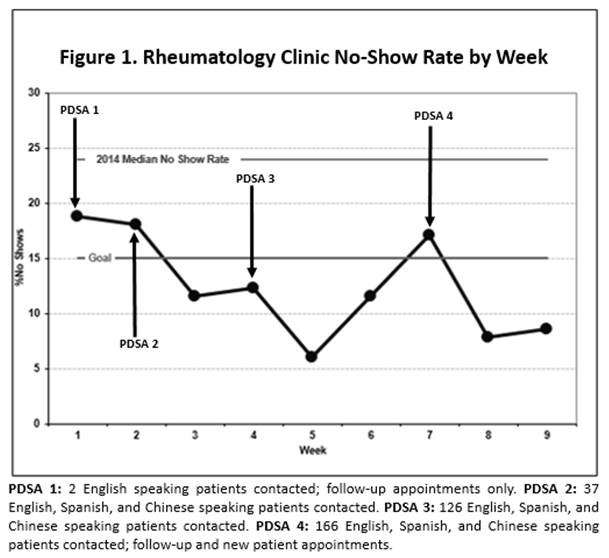Session Information
Session Type: ACR Poster Session C
Session Time: 9:00AM-11:00AM
Background/Purpose: High
appointment no-show rates lead to disrupted delivery of care and inefficient
use of healthcare resources. Appointment reminder calls are cost-effective in
lowering no-show rates. Previous studies, however, have largely been performed among
English-speaking populations. We aimed to improve the reminder call system at a
county hospital rheumatology clinic with an at-risk multilingual patient population
(Cantonese, Mandarin, Spanish and English). Using the Institute for Healthcare
Improvement’s Model for Improvement, we studied no-shows in this diverse
population and used Plan-Do-Study-Act (PDSA) cycles to evaluate the effect of
improving the clinic’s appointment reminder system. Our specific aim was to reduce
the no-show rate from 24%, the clinic’s 2014 average, to 15% by May 2015.
Methods: First, we studied
and mapped the current appointment reminder system. We developed a survey (in
English, Spanish, and Chinese) to determine how clinic patients were reminded
of their most recent appointment and their preferences regarding future
reminders. We then used PDSA cycles to test changes to the reminder system. A
multilingual clinic staff team (English, Spanish, Cantonese, and Mandarin) was assembled
to deliver language appropriate reminder calls. Ultimately, this language
specific call system was scaled up to include all English, Spanish, and Chinese
speaking patients.
Results: While it was
assumed that most patients received both letter and phone reminders for
upcoming appointments, our survey (N=50) indicated otherwise; 60.3% received a
letter, 27.6% received a call, 13.8% received both, and 22.4% received no
reminder. Our survey also revealed patient preferences for future letter (68%),
phone (54%), and text message (25.9%) reminders. These results helped focus our
PDSA cycles on improving the phone call reminder system, since letters were
received more reliably, and phone calls were preferred by many patients. Baseline
data revealed an average no-show rate of 24% in 2014 (Figure 1). Four PDSA
cycles were completed, with the final cycle resulting in more consistent
reminder calls in multiple languages. The median no show rate between February and
May 2015 (N=331) following implementation of the new reminder system decreased
to 11.6%.
Conclusion: Coordination
across clinic staff to form a multilingual team that delivered language
appropriate reminder calls measurably reduced the no-show rate in our county
hospital rheumatology clinic.
To cite this abstract in AMA style:
Beach S, Goglin S, Margaretten M, Trupin L, Yazdany J. No More No Shows: Improving the Appointment Reminder System at an Urban County Hospital Outpatient Rheumatology Clinic [abstract]. Arthritis Rheumatol. 2015; 67 (suppl 10). https://acrabstracts.org/abstract/no-more-no-shows-improving-the-appointment-reminder-system-at-an-urban-county-hospital-outpatient-rheumatology-clinic/. Accessed .« Back to 2015 ACR/ARHP Annual Meeting
ACR Meeting Abstracts - https://acrabstracts.org/abstract/no-more-no-shows-improving-the-appointment-reminder-system-at-an-urban-county-hospital-outpatient-rheumatology-clinic/

